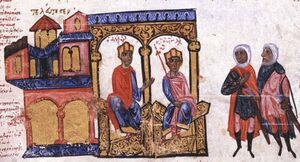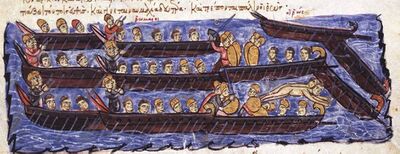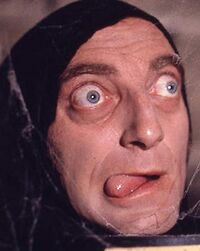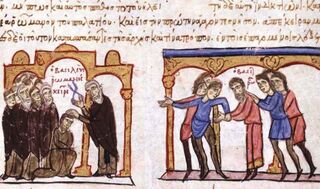Romanos I
“I was on the good ship Venus. My name is Lekapenos. I seized the throne to make my home, to prove that I am a genius.”
Romanos I (870 – 15 June 948) was the Byzantine Emperor from 919 to 944. He was born in a hut and came from a naval background, and rose to become the de facto ruler of the empire. Unusually he took power in Constantinople from the bow of a ship rather than the saddle of a horse as many had done before him and would do so in future. At one time Romanos shared running the empire with his sons in various positions whilst the original occupant Constantine VII was forced to stand in the corner or go to his room. And then it was all taken away. Not from an enemy without but by his own kindred, frustrated that their father hadn't the decency to die of old age.
Origins[edit]
His full name was Romanos Lekapenos, a good name to giggle about if you are learning Byzantine history. It has a castratory feel about it — perhaps apt, as Romanos grew up in the Byzantine world where regular eye gouging and genital mutilation were the order of the day. It was a fate that was carried out on the lowest peasant to a deposed emperor. At least every man appeared to have equal access to gruesome punishment. Just to say here that Romanos at least lived long enough to escape these physical punishments (or forfeits), though some of his family lost at least one or two of their physical faculties. Women (at least high born ones) weren't punished this way. They were sent to monasteries.
Romanos came from the town of Melitene in what is now Eastern Turkey. It was a border province of the Byzantine Empire, but with plenty of Muslim Arabs just across the border ready to drop by for some Holy War and plunder. His father was called Theophylaktos Abastaktos, which translates as Theophylaktos the Unbearable. This suggests he had bad body odour or someone you would cross the street to avoid.
Romanos had other uncles like Leo the Untidy and Michael the Unspeakable. Romanos was an only son, his mother left the family set-up so quickly that no one recorded her name. Perhaps this background explains why Romanos was keen to leave. He ran away to become a sailor.
[edit]
It might be odd to say but during this era and indeed later ones, the distinction between fighting on land or sea was pretty much similar. Ships were built to ram into each other and then battle would take place. So though Romanos later became an admiral, he had enough land experience as a general to qualify for extra ribbons on his battle dress. However it was said he had difficulty reading Greek and had a very strong regional accent that defied translation or understanding.
The Byzantine navy at this stage (in the 890s) had gone through some bad times. They had been unable to defend the Byzantine empire's western territories like Sardinia and Corsica and had lost the valuable territory of Sicily except for a couple of castles on the coast. Even more damaging was the loss of Crete which gave the Muslims an ideal air craft carrier size blockage of the Aegean Sea. Attempts to retake this island had failed and would do so again whilst Romanos was in charge later.
At some stage Romanos managed to take a vacation from his military duties to father a number of healthy sons and daughters, perhaps from two marriages and at least one adventure on the side. Perhaps the need to provide for all of them drove Romanos to get a move on in his career.
Sailing Into Power[edit]
The death of Byzantine emperor Alexander had left the state in the hands of its seven-year-old ruler Constantine VII. Power was actually in a tug of war between Constantine's mother Zoe Karbonopsina and the Patriarch of Constantinople Nicholas Mystikos or "Mystic Nick" who spoke in parables and riddles. The number one enemy they had to contend wasn't the Muslims in the East for once but their close neighbours and recent converts to Christianity the Bulgarians.
In the recent past the Byzantines had been bribing the Bulgarians not to invade their country. This regular appeasement tax had been repudiated by emperor Alexander and that policy had been carried on by the regency government of Constantine VII. Mystic Nick had suggested they go back to paying it again but that had allowed Zoe to remove him from the government and run the Byzantine empire with her own supporters.

Romanos (now an admiral) was in charge of the fleet and had taken part in a joint army–naval operation against the Bulgarians in 917. This had been a failure. The Bulgarians got to Constantinople but couldn't break in. Empress Zoe got the blame for this defeat. Perhaps God was trying to tell the Byzantines something. Don't let women run the empire? This was Mystic Nick's chance of political revenge on Zoe. He would use the navy to overthrow the government. Romanos went along with the plot. In 919 he sailed his ships into Constantinople's harbour. Nothing unusual about that but leading his armed sailors, they managed to get into the imperial palace without any serious challenge. Romanos claimed he was there to support the young emperor and that the country needed a "re-steering". Blaming the army (especially the absent Leo Phokos) for the military defeats, Romanos took effective power. Patriarch Mystic Nick was brought back into the regency council whilst empress Zoe was bundled out of power. She was exiled to a monastery (with a nunnery wing) and then simply disappears off the historical record. To consolidate his power Romanos insisted 15-year-old Constantine marry his daughter Helena. She was just 10.
What follows was a rapid sequence of events. In a matter of months Romanos had speedily given himself the title of the "Imperial Stepfather" (Basileopator in Greek), then "Caesar" and co-emperor before the year was out. In 920 Romanos went one better and appointed himself "senior emperor" which meant he got priority seating in the throne room. It had been a rapid ascent for a very salty sea dog.
Rule[edit]
No sooner had Romanos had become emperor than he invited the entire family to the imperial palace in Constantinople. Besides his daughter Helena, this meant sons Christopher, Stephanos, Constantine ("Mikro Lekapenos" on account of his size), Theophylact and two other daughters whose names no one seems to have recorded, even though they were married off later and not consigned to the usual fate of spare daughters — custody of a particular religious foundation. In addition, the fifty-year emperor included at least one son Basil conceived outside his marriage as well in the Lekapeni family free for all. All would be appointed to a job of some type.
The mass move in of Romanos's family completely obscured Constantine VII's position. He remained emperor but in the next few years his legitimate brothers-in-law (except Theophylact) were granted the same title with lavish ceremonies and coronations at the Hagia Sophia. Constantine VII retreated into the background, though his wife Helena made sure her husband remained safe from any attempts to depose or disfigure him from her malicious brothers.
Romanos may have been of pensionable age for the time when he became emperor but he showed enough energy to defend the Byzantine Empire. The war with the Bulgarians rumbled on intermittently. His ally Mystic Nick was dispatched to Tsar Simeon's tent city capital in Bulgaria as an ambassador. Whether Mystic Nick wanted to go or not, his extended absence meant Romanos essentially ruled unchallenged.
The Bulgarian threat was eventually alleviated in 927 by marrying Tsar Simeon's son Peter into Romanos's extended family. The bride this time was his grandchild Maria (aged about 10), daughter of his eldest son Christopher. The Bulgarians seemed happy with the match, the peace held between them for the next fifty years. Maria (re-branded as Irene) was sent off to meet her new husband.
When Mystic Nick died from trenchfoot after spending so long with the Bulgarians in muddy Balkans field, Romanos put forward his youngest son as the next Patriarch of Constantinople. Theophylact (aged 8) "willingly parted with his genitals" as a chronicler implausibly wrote at the time but the appointment was overuled on the "beard" ground. Theophyact was too young to sport one. He had to wait until he was 16 to get the job in 933. By then he had been gelded, just like his bastard brother Basil who had also gone down the castration method to have a job in the church.
With the Bulgarian front stabilised, the Byzantines tried to push the frontiers on the East at a bit. Success was mixed but the Byzantine army appeared to have got the best of it. Closer to home and from out of the blue came a Russian fleet who crossed the Black Sea twice to attack Constantinople. They were led by the Swedish viking Igor on a sabbatical from working with Frankenstein. The Byzantines were impressed with the Russian disregard for their own casualties until they got a lethal squirt from the application of Greek Fire. The Russians were pagans but if they converted...now that would be handy.
Conspiracy[edit]
Romanos's keenness to stuff family and friends into imperial postings didn't always come to plan. His wife Theodora died early in his reign and there was a plan to depose him in favour of his co-emperor son Christopher Lekapenos on the grounds the emperor was a boring old fart. The leader of this conspiracy was Christopher's father-in-law Niketas. The former denied any knowledge of the plot when it was uncovered. Niketas got exiled for his scheming. Christopher had by then displaced Constantine VII in the hierarchy of emperors as second after Romanos but then died in 931.
Neither of Romanos's other sons Stephanos and Mikropenos got to replace Christopher in the pecking order. Christopher's own sons were judged by Romanos to be "too young" to replace their father in his former position which effectively meant Constantine VII had moved a little more centre-stage. This worried Stephanos and Mikropenos. If their father died suddenly (and he was pushing 70 by now), the brothers worried Constantine VII would take full control and punish them for their treatment of the imperial brother-in-law. They decided to overthrow Romanos and then move against Constantine VII.
The palace coup happened in 944. Stephanos and Mikropenos snuck into their father's bedroom and arrested him. Again the imperial bodyguard had conveniently gone missing. The brothers had agreed to exile Romanos to a small nearby island, but were still debating whether to have the balls off or not (eyeballs or testicles), which would disqualify him, by Byzantine tradition, from further emperorship. But they still "loved their old pa" and went with a lesser disqualification, turning him into a monk with a harsh haircut and shaving the top of the head to create a large bald spot (a tonsure, as it was called). Before Romanos was fully awake or dressed, he was "monked" and sent into exile. His reign was over — but he would get the last laugh.
Involuntary retirement[edit]
Romanos was dispatched to the Princes' Islands, a small cluster of rocks in the Sea of Marmara just south of the imperial capital. They had been often used as a place of exile for troublesome members of an imperial family. A few months Romanos welcomed a new flotilla approaching his new home. These were ships carrying Stephanos and Constantine 'Mikropenos'. They had been overthrown in a counter rebellion largely organised by Old Romanos's daughter empress Helena for her husband. Romanos is said to have laughed so hard when he saw his sons coming ashore in chains that he broke the chair he was sitting on. Romanos remained safe and was quite content to spend his days playing solitaire or telling tall tales about his sea adventures. He died in 948, aged 78.
The old emperor's death was treated as a national holiday by Constantine VII. Bottled old resentments came out when Constantine described his late father-in-law as "an ignoramus of the first order and an unworthy occupant of Caesar's throne". This is a trifle unfair. Despite this, Romanos's body was brought back to Constantinople and buried in the family church attached to their own personal and imperial palace. His body has long gone as has the palace but the church survives. It is now a mosque.
| Preceded by: Constantine VII |
Byzantine Emperor 919–944 |
Succeeded by: Stephanos and Constantine Lekapenos |









